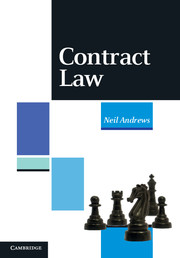Book contents
- Frontmatter
- Contents
- Preface
- Table of cases
- Table of statutes
- Table of statutory instruments
- Part I Introduction
- Part II Formation
- Part III Consideration and intent to create legal relations
- Part IV Third parties and assignment
- 7 Third parties
- 8 Assignment
- Part V Vitiating elements
- Part VI Terms and interpretation
- Part VII Breakdown and liability
- Part VIII Remedies for breach
- Part IX Illegality and public policy
- Part X The future
- Appendix: A who's who of contract law
- Bibliography
- Index
7 - Third parties
from Part IV - Third parties and assignment
- Frontmatter
- Contents
- Preface
- Table of cases
- Table of statutes
- Table of statutory instruments
- Part I Introduction
- Part II Formation
- Part III Consideration and intent to create legal relations
- Part IV Third parties and assignment
- 7 Third parties
- 8 Assignment
- Part V Vitiating elements
- Part VI Terms and interpretation
- Part VII Breakdown and liability
- Part VIII Remedies for breach
- Part IX Illegality and public policy
- Part X The future
- Appendix: A who's who of contract law
- Bibliography
- Index
Summary
INTRODUCTION
Summary of main points
(1) At common law (that is, under the judicial law established prior to the change introduced by the Contracts (Rights of Third Parties) Act 1999) (see the summary at (3) below), a third party cannot enforce a contract intended by the parties to be for her benefit. And so at common law, a non-party, T, cannot sue A directly if A promises B that A will pay £1,000 to T, in return for a counter-promise by B to do something. It is different if B assigns this debt to Z, because Z can then sue A. But assignment can only occur after the formation of the contract between A and B. Assignment is examined in chapter 8.
(2) The Law Commission successfully recommended a legislative system of third party rights: the Contracts (Rights of Third Parties) Act 1999.
(3) The 1999 Act enables a third party to acquire a direct right of action (or the right to benefit from an exclusion clause) either by explicit language (A and B state clearly that ‘T can sue A directly’) or by implication (A and B agree that A will ‘confer a benefit’ on T, for example, that A will pay a sum to T); this will normally entitle T to sue A for this amount, even though the right of action was not spelt out; but A might succeed in countering this inference.
[…]
- Type
- Chapter
- Information
- Contract Law , pp. 186 - 223Publisher: Cambridge University PressPrint publication year: 2011



